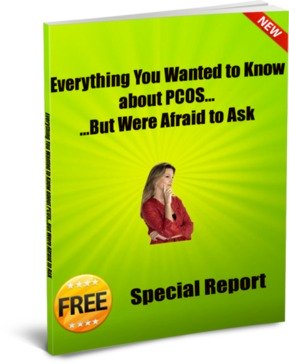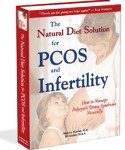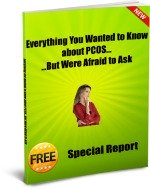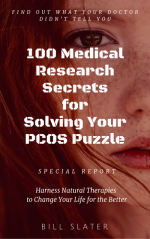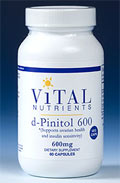PCOS Review Newsletter #116
1) What's a Better Breakfast for PCOS? Eggs or Bagels?
3) Produce "Good" Hormones by Getting More Sleep
1) What's a Better Breakfast -- Eggs or Bagels?
If you have read The Natural Diet Solution for PCOS and Infertility ebook, you may have noticed something unusual in the daily meal plans.
The breakfast meal plans nearly always include eggs or some other protein. You won't see bagels, breakfast cereal or toast for breakfast.
Why is this so important for controlling polycystic ovary syndrome?
Medical studies show that what you eat for breakfast affects your blood sugar and hormones as well as your hunger.
For example, the University of Connecticut studied a group of men. One week, they had a breakfast of eggs. Another week they had a breakfast of bagels. Three hours after breakfast, they were allowed to have a buffet lunch where they could eat all they wanted.
The researchers discovered that when the breakfast was eggs, the men's blood sugar was lower, their insulin was lower, they felt more satisfied after breakfast, and they ate less for lunch.
In contrast, when they had bagels for breakfast, their blood sugar and insulin were worse. They were more likely to feel hungry after breakfast and they consumed more calories at lunch.
Blood sugar, insulin and appetite disorders are a huge problem for women with PCOS because these disorders mess up all the other hormones, plus they make you gain weight.
The #1 thing you can do about polycystic ovary syndrome is to improve your diet. For breakfast ideas, check out the 30-day meal plan in the ebook.
P.S.: The concern about cholesterol in eggs is overblown. For more information about eggs, read chapter 8.4 of the ebook.
Source: Ratliff J et al, Consuming eggs for breakfast influences plasma glucose and ghrelin, while reducing energy intake during the next 24 hours in adult men, Nutr Res. 2010 Feb;30(2):96-103
3) Produce "Good" Hormones by Getting More Sleep
Are you living such a busy life that you don't have time to get much sleep? If so, you're digging yourself into a hole.
The amount of sleep you get has a profound on your hormones. It also affects your dietary patterns.
We came across a couple of very interesting studies of people who don't get enough sleep. The first study evaluated 126 girls (ages 14-18). Those who slept less than five hours per night tended to load up on undesirable carbohydrates as compared to those who got at least seven hours of sleep.
Moreover, the sleep-deprived girls had lower levels of adiponectin, a beneficial hormone. Among other things, you need adequate adiponectin levels for healthy ovarian function and formation of the placenta.
Low adiponectin levels are also associated with insulin resistance, which is a root cause of polycystic ovarian syndrome.
Women who have PCOS commonly have depressed adiponectin levels to begin with. So if you have PCOS and are not getting enough sleep, it's a hormonal double-whammy against you.
Another study has shown that sleep deprivation for even one night causes an increase in insulin resistance.
We recommend you get at least 7-8 hours of sleep every night. Sleep is when your body heals and restores itself. Adequate sleep will definitely help you to gain the upper hand over PCOS.
Sweet dreams!
Sources:
Al-Disi D et al, Subjective sleep duration and quality influence diet composition and circulating adipocytokines and ghrelin levels in teen-age girls, Endocr J. 2010 Aug 21. [Epub ahead of print]
Donga E et al. A single night of partial sleep deprivation induces insulin resistance in multiple metabolic pathways in healthy subjects, J Clin Endocrinol Metab. 2010 Jun;95(6):2963-8
Thought for Today: "The greatest pollution problem we face today is negativity. Eliminate the negative attitude and believe you can do anything. Replace 'If I can, I hope, maybe' with 'I can, I will, I must'." -- Mary Kay Ash
PCOS Health Review
This free newsletter gives you original and immediately usable information to help you deal with PCOS.
Get the latest research, tips for improving your health, answers to questions, success stories, and more!
Your e-mail address is totally secure. We will never misuse your information.
Enter Your Email Above to Subscribe Today
and Get Your Questions Answered in this Free Special Report!
